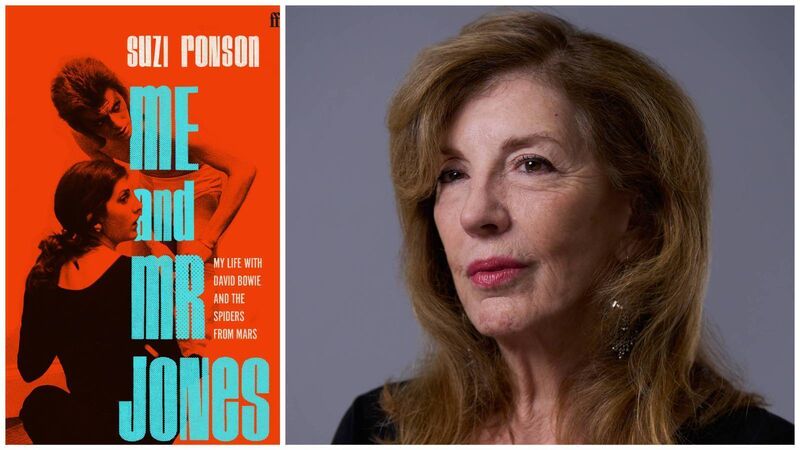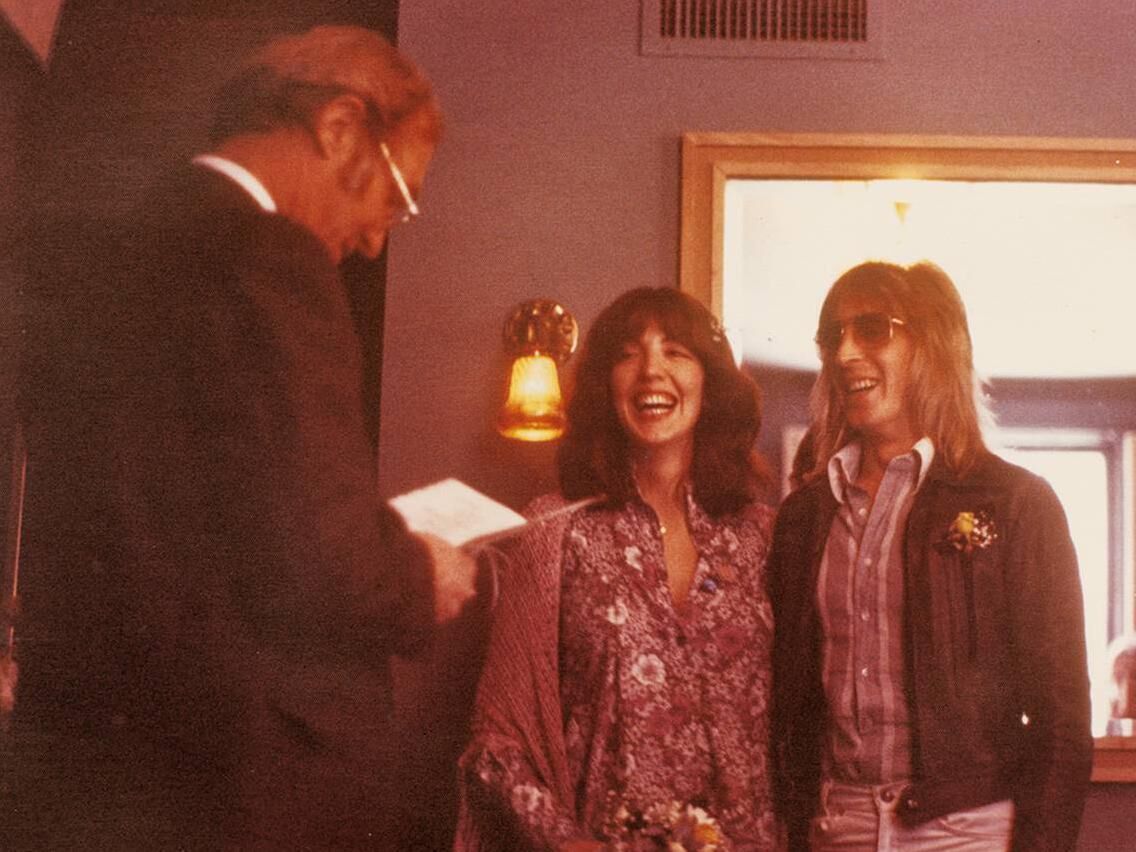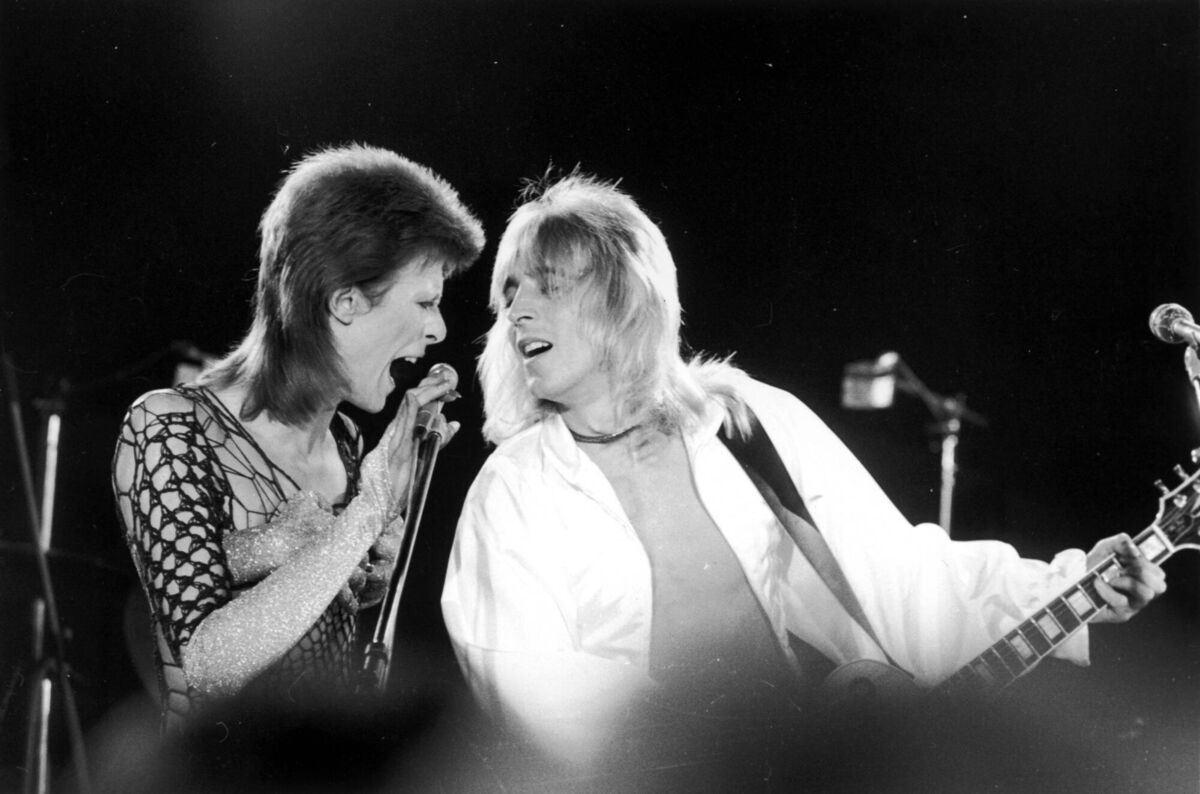Suzi Ronson on the Bowie years, the Ziggy hairstyle, and the Spiders' bad breakup

Suzi Ronson's memoir Me and Mr Jones is out now
I find Suzi Ronson on the Lust for Life tour, with a crack team of musicians including Glen Matlock of the Sex Pistols, and Blondie’s Clem Burke. Suzi’s claim to fame in the rock is through her roles as David Bowie's hairdresser and Mick Ronson's wife, and her storied life travelling with that seminal outfit in the 1970s.
She compares those Ziggy Stardust experiences - where she left her English suburban life in the distance - to running away and joining the circus. Now 74, Ronson retains a transatlantic glamour that brightens up a dull winter afternoon.
Her connection to Bowie began with his mother Peggy, who was a regular visitor to the Evelyn Paget salon in Beckenham. "She would talk about 'my David'; it was more a social thing back then. People would talk about their families while their hair was in rollers. I didn't pay much attention until one day she mentioned ‘Space Oddity’ and I realised it was David Bowie as her name was Mrs Jones. It had been a couple of years since David had a hit and he was playing locally at the Three Tuns."
Back then Suzi Fussey lived in a semi-detached house with nine people under one roof. "My mother thought we were middle class," she laughs. "First I cut David's mum's hair, then it was Angie [his wife] and then I was invited to cut David's hair. They had a lot of friends who were hairdressers; by asking one of them someone would be upset so they picked me."
The public image of Bowie was of a curly-haired folkie who had a hit with ‘Space Oddity’. Ziggy Stardust's haircut would soon become one of the most famous in pop culture taking on a life of its own. Early images look closer to Bowie's mod haircut of the 1960s, the journey from Ziggy to Aladdin Sane would take on several variations.
"When you look at early pictures the haircut is quite floppy and not standing up like on Aladdin Sane and Pin-Ups. I thought the Pin-Ups image was incredible, and I was in awe of Twiggy [the album's co-cover star], growing up in the 1960s I was a well-built girl with glasses. Her skin was flawless, she was suntanned and the contrast with David was stunning.
“The picture was originally for Vogue but as soon as he saw it he said: ‘I want that for the album cover’. I couldn't get it to stand up at first, in those days we didn't have heavy-duty gel so I used this product called Gard, an anti-dandruff treatment from Germany."
The brighter orange colour and Ziggy style, as Kevin Cann's book Any Day Now suggests, didn't fully arrive until St Patrick's Day 1972 thanks to Schwarzkopf Red Hot Red with 30 volume peroxide. "If that didn't work I was going to bleach it white and then put the red in," she adds.
Fussey, not yet Mrs Ronson until getting together with Mick after the Spiders split, would soon become an essential and trusted part of Bowie's entourage. As well as hair duties, she arranged wardrobe, did make-up and had a glass of wine and Gitane cigarette ready between costume changes or after the show.
As her new memoir suggests, a pre-requisite for the job appeared to be a one-night stand with the boss. "David was after everything,” she explains today. "With me, it was a bloke thing. It was an okay night, I wasn't in love with David before or after it happened. I was curious about David and Angie's lifestyle. David liked to mark his territory, and he knew he had the power."
She would also on occasion procure groupies for Bowie. "David might have fooled around but he never struck me as gay,” she says of a star followed by tales of encounters with both genders in that era. “There were many more girls in his bed than blokes, there is one [young male fan] mentioned in the book that went to his room but they might have sat and talked. David liked to shock."
There was a shift in attitude around Fussey's family and friends when Bowie announced to Melody Maker that he was gay. It's largely viewed as a publicity stunt that worked bringing Bowie much-needed press attention. "When David gave the interview saying he was gay, my father said to me: ‘So you're working for a poof then?’ He didn't like 'poofs'. I mean, just a few years before you could go to jail. Back then it was viewed as 'abnormal' and that's how most people felt in the early 1970s."

Fussey was invited to be part of the entourage when Lou Reed and Iggy Pop arrived for a press conference at the Dorchester Hotel in London, she could feel further disparity with her life prior to meeting Bowie. "My dad was a chauffeur and would pick guests up at the Dorchester - no one walks there - and here I was walking to this press conference. David, Iggy and Lou were all sat together on one couch and David was telling them they were ushering in a new kind of music and he wasn't far wrong. I was quite innocent of drug-taking but I think I would have been surprised if you said to me Iggy would be the one that was still standing out of the three of them at that point in 1972."
The mythologised Ziggy character would last only 18 months but during that time Bowie's work with the Spiders From Mars, as well as Lou Reed and Iggy Pop, produced some of the best work of all their careers. Musician, producer and arranger Mick Ronson played a vital role.
"When you think about how much they crammed in with albums like Hunky Dory and Lou Reed's Transformer it was a huge amount of work,” reflects Suzi. “During that time I felt Mick was the other half of David, he could not have made those records without him. It's the same with Transformer when you listen to ‘Perfect Day’. What a gorgeous song and the piano part was Mick. Lou would strum an acoustic and Mick would be there conducting. He put a lot of himself into that record."
Suzi was one of the few people aware that Bowie was going to break up the Spiders live on stage in July 1973. She admits it was an uncomfortable secret. "It was a very bad way of doing things and I don't hold back, it was disgraceful. I had known since we were on tour in Japan [April 1973] and I felt it was horrible. I kept thinking he would change his mind by the time we got there."
Mick Ronson was also aware of what was going to happen but drummer Woody Woodmansey and bassist Trevor Bolder found out the band was splitting live on stage. Ronson remained pragmatic about the end. "Mick was never a bitter man or said anything about what David should have done, never did that happen. I think they kept in touch but Mick never told me because I was pissed off with David."

Ronson continued life as a working musician including spells with Bob Dylan and Van Morrison. "With Van, it was a weird period he [Van] left halfway through a tour and never went back. Mick didn't know what happened."
Professional footage of Ronson with Morrison and Dr John is well worth seeking out. "Mick could enhance anyone he played with. Dylan looked at him a couple of times in surprise; Dylan and Mick were a good match."
Ronson was also well matched with Morrissey in 1992, producing one of his finest solo long-players, Your Arsenal. "Mick was very ill when working on that record. I think he talked to Morrissey just before he died," says Suzi.
Your Arsenal included a musical nod to Bowie's torch song ‘Rock N' Roll Suicide’ on the track ‘I Know It's Gonna Happen Someday’. "Morrissey had said to Mick, 'We can't use that' but his reply was 'I wrote it' about the track's end coda.”
Bowie responded in kind by covering the song himself for his 1993 album Black Tie White Noise, on which Ronson appeared for a version of Cream's ‘I Feel Free’. Mick Ronson, at the age of 46, died of liver cancer just a few weeks after its release. "I think Mick's time was coming around again after that Morrissey record," says Suzi today with a tear in her eye. "He really would have come into his own.”
- Suzi Ronson's Me and Mr Jones is out now, published by Faber and Faber



